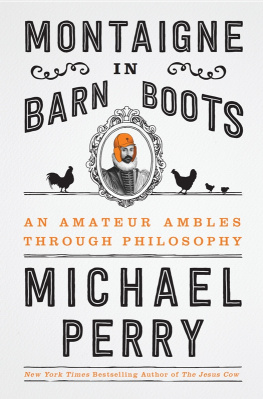Michel de Montaigne
15331592
Michel de Montaigne
On Friendship
TRANSLATED BY M. A. SCREECH
PENGUIN BOOKS GREAT IDEAS
PENGUIN BOOKS
Published by the Penguin Group
Penguin Books Ltd, 80 Strand, London WC2R ORL , England
Penguin Group (USA) Inc., 375 Hudson Street, New York, New York 10014, USA
Penguin Books Australia Ltd, 250 Camberwell Road, Camberwell, Victoria 3124, Australia
Penguin Books Canada Ltd, 10 Alcorn Avenue, Toronto, Ontario, Canada, M4V 3B2
Penguin Books India (P) Ltd, 11 Community Centre, Panchsheel Park, New Delhi 110 017, India
Penguin Group (NZ), Cnr Airborne and Rosedale Roads, Albany, Auckland 1310, New Zealand
Penguin Books (South Africa) (Pty) Ltd, 24 Sturdee Avenue, Rosebank 2196, South Africa
Penguin Books Ltd, Registered Offices: 80 Strand, London, WC2R 0RL , England
www.penguin.com
This translation first published in Penguin Classics 1991
This edition published in Penguin Books 2004
Translation copyright M.A. Screech. 1991
All rights reserved
The moral right of the translator has been asserted
Taken from the Penguin Classics edition of The Complete Essays, translated and introduced by M. A. Screech
Except in the United States of America, this book is sold subject to the condition that it shall not, by way of trade or otherwise, be lent, re-sold, hired out, or otherwise circulated without the publishers prior consent in any form of binding or cover other than that in which it is published and without a similar condition including this condition being imposed on the subsequent purchaser
ISBN: 978-0-14-196487-4
1
On friendship
I was watching an artist on my staff working on a painting when I felt a desire to emulate him. The finest place in the middle of a wall he selects for a picture to be executed to the best of his ability; then he fills up the empty spaces all round it with grotesques, which are fantastical paintings whose attractiveness consists merely in variety and novelty. And in truth what are these Essays if not monstrosities and grotesques botched together from a variety of limbs having no defined shape, with an order sequence and proportion which are purely fortuitous?
Desinit in piscem mulier formosa superne.
[A fair woman terminating in the tail of a fish.]
I can manage to reach the second stage of that painter but I fall short of the first and better one: my abilities cannot stretch so far as to venture to undertake a richly ornate picture, polished and fashioned according to the rules of art. So I decided to borrow a painting from Etienne de La Botie, which will bring honour to the rest of the job: I mean the treatise to which he gave the title On Willing Slavery but which others, not knowing this, very appropriately baptised afresh as Against One. He wrote it, while still very young, as a kind of essay against tyrants in honour of freedom. It has long circulated among men of discretion not without great and well-merited esteem, for it is a noble work, as solid as may be. Yet it is far from being the best he was capable of. If, at the age when I knew him when he was more mature, he had conceived a design such as mine and written down his thoughts, we would now see many choice works bringing us close to the glory of the Ancients; for, particularly where natural endowments are concerned, I know nobody who can compare with him. Yet nothing of his survives apart from this treatise and even that is due to accident: I do not think he ever saw it again once he let go of it and some Considerations on that Edict of January which our civil wars have made notorious: I may perhaps still find a place for it elsewhere. That is all I have been able to recover of his literary remains, I the heir to whom, with death on his lips, he so lovingly willed his books and his papers apart from the slim volume of his works which I have had published already.
Yet I am particularly indebted to that treatise, because it first brought us together: it was shown to me long before I met him and first made me acquainted with his name; thus preparing for that loving-friendship between us which as long as it pleased God we fostered so perfect and so entire that it is certain that few such can even be read about, and no trace at all of it can be found among men of today. So many fortuitous circumstances are needed to make it, that it is already something if Fortune can achieve it once in three centuries. There seems to be nothing for which Nature has better prepared us than for fellowship and Aristotle says that good lawgivers have shown more concern for friendship than for justice. Within a fellowship the peak of perfection consists in friendship; for all forms of it which are forged or fostered by pleasure or profit or by public or private necessity are so much the less beautiful and noble and therefore so much the less friendship in that they bring in some purpose, end or fruition other than the friendship itself. Nor do those four ancient species of love conform to it: the natural, the social, the hospitable and the erotic.
From children to fathers it is more a matter of respect; friendship, being fostered by mutual confidences, cannot exist between them because of their excessive inequality; it might also interfere with their natural obligations: for all the secret thoughts of fathers cannot be shared with their children for fear of begetting an unbecoming intimacy; neither can those counsels and admonitions which constitute one of the principal obligations of friendship be offered by children to their fathers. There have been peoples where it was the custom for children to kill their fathers and others for fathers to kill their children to avoid the impediment which each can constitute for the other: one depends naturally on the downfall of the other.
There have been philosophers who held such natural bonds in contempt witness Aristippus: when he was being pressed about the affection which he owed to his children since they had sprung from him, he began to spit, saying that that sprang from him too, and that we also engender lice and worms. And there was that other one whom Plutarch sought to reconcile with his brother but who retorted: He matters no more to me for coming out of the same hole.
The name of brother is truly a fair one and full of love: that is why La Botie and I made a brotherhood of our alliance. But sharing out property or dividing it up, with the wealth of one becoming the poverty of the other, can wondrously melt and weaken the solder binding brothers together. Brothers have to progress and advance by driving along the same path in the same convoy: they needs must frequently bump and jostle against each other. Moreover, why should there be found between them that congruity and affinity which engender true and perfect friendship? Father and son can be of totally different complexions: so can brothers. He is my son, he is my kinsman, but he is wild, wicked or daft! And to the extent that they are loving relationships commanded by the law and the bonds of nature, there is less of our own choice, less willing freedom. Our willing freedom produces nothing more properly its own than affection and loving-friendship. It is not that I have failed to assay all that the other kind can afford, having had the best father who ever was, and the most indulgent even into extreme old age, and coming as I do from a family renowned and exemplary from generation to generation in the matter of brotherly harmony:
et ipse
Notus in fratres animi paterni.
[And myself known for my fatherly concern for my brothers.]
You cannot compare with friendship the passion men feel for women, even though it is born of our own choice, nor can you put them in the same category. I must admit that the flames of passion








